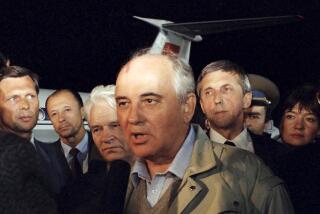Changes in the Soviet Union
- Share via
Hough’s column is a puzzling mixture. There is much that is wise. No doubt Moscow has been frustrated that its efforts to improve relations with Washington have produced so little movement in the rigid positions of the Reagan Administration. Moreover, some members of the Soviet elite think Gorbachev has made too many concessions and gotten too little in return.
Undoubtedly, too, the Kremlin must be exasperated by how little the presidential election has generated serious discussion of Soviet/American relations. Hough is correct to warn of the dangers for the next president that will result from the “bumper sticker” approach taken to these issues by American leaders during the past decade.
But Hough’s reading of the impact that changes in the Kremlin will have on foreign policy goes beyond what we know and misreads the current mood of the Soviet leadership. Foreign policy is firmly in the hands of General Secretary Gorbachev, Foreign Minister Eduard Shevardnadze and Party Secretary Alexander Yakovlev. The first two have been the architects of the “new thinking,” which pivots around reduced superpower tensions and arms control. They made those very concessions Hough cites to get the INF treaty. There is no evidence that they have altered their views.
Yakovlev has, of course, written in the past in favor of reducing the preoccupation of Soviet foreign policy with American relations. But he also spent the late summer attacking the far more orthodox and dangerous foreign policy views of Yegor Ligachev, whose role in foreign policy has clearly been reduced.
The views on foreign policy of the former KGB chief Viktor Chebrikov and his successor Vladimir Kryuchkov are not known in any detail. But what is known does not support the proposition that they are anti-American or that they agree with the earlier writings of Yakovlev in favor of reducing the importance of Soviet/American relations.
Thus, Hough’s general warnings on U.S. policy have much to recommend them. But to construct his dissent with Washington, he overstates or misstates the foreign policy consequences of recent changes in Moscow.
LARRY T. CALDWELL
Los Angeles
More to Read
Sign up for Essential California
The most important California stories and recommendations in your inbox every morning.
You may occasionally receive promotional content from the Los Angeles Times.












